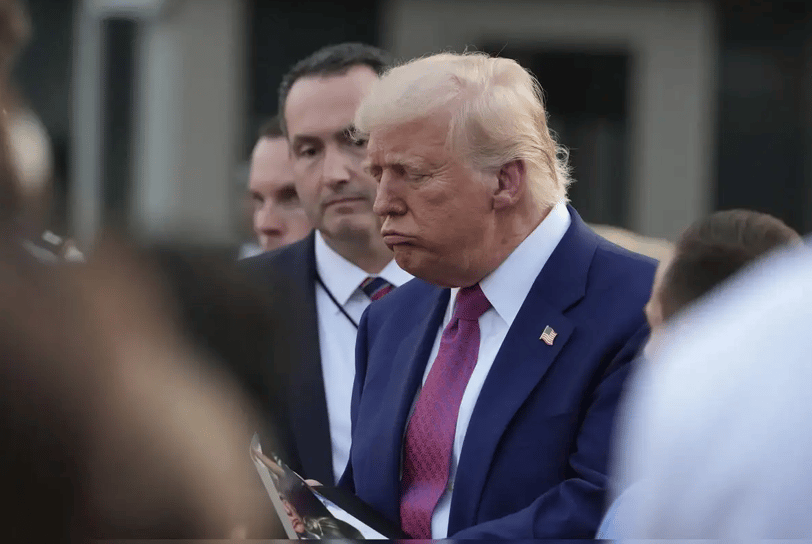Trump's Two-Week Deadline on Israel-Iran Conflict: A Multifaceted Hesitation
6/20/20253 min read


Trump's Two-Week Deadline on Israel-Iran Conflict: A Multifaceted Hesitation
Introduction
On June 19, 2025, White House Press Secretary Karoline Leavitt announced that President Donald Trump would decide within the next two weeks whether the United States would intervene in the escalating conflict between Israel and Iran. This statement, captured in a viral X post by Acyn, has sparked intense speculation and analysis about Trump's hesitation. As the world watches, understanding the layers behind this delay is crucial. This blog post delves into the strategic, political, and personal dimensions of Trump's decision-making process, offering a comprehensive view that engages readers and provides valuable insights.
Strategic Delay and "TACO-ing"
One of the most prominent aspects of Trump's hesitation is his strategy of delay, often referred to as "TACO-ing" (Taking A Chance On). This approach, evident in previous decisions like the extension of the TikTok ban deadline, involves postponing action in the hope that issues resolve themselves. In the context of Iran, this tactic might be an attempt to avoid immediate escalation while keeping options open. The two-week window could be seen as a period to assess the situation further, allowing for potential de-escalation through diplomatic channels or waiting for a shift in the conflict's dynamics.
Domestic Political Considerations
Trump's base is notably divided on foreign interventions, particularly in the Middle East. The "America First" rhetoric that propelled him to office contrasts sharply with the expectations of some supporters for robust support of Israel. Figures like Charlie Kirk and Steve Bannon have expressed skepticism about U.S. involvement, while others advocate for a more interventionist stance. This division within his voter base complicates Trump's decision, as he must navigate these internal dynamics carefully. His hesitation could be a strategic move to maintain unity within his party, especially as he approaches the latter stages of his second term.
International Diplomacy and Negotiation
The possibility of negotiations with Iran, as mentioned by Leavitt, adds another layer to Trump's hesitation. His campaign promises to avoid "stupid endless wars" and his recent emphasis on diplomacy suggest a preference for non-military solutions. The ongoing war of words between the U.S. and Iran, coupled with Iran's rejection of U.S. demands, makes diplomatic efforts challenging but not impossible. Trump's delay might be an attempt to leverage this window for negotiation, aiming to de-escalate without losing face on the international stage.
Military and Geopolitical Risks
Engaging in a conflict with Iran carries significant risks, including the potential for a broader regional war, increased military and financial costs, and the involvement of other global powers. The build-up of U.S. forces in the region and international calls for restraint highlight the gravity of these risks. Trump's hesitation could be influenced by the need to thoroughly assess these implications, ensuring that any decision aligns with national security interests and minimizes unintended consequences.
Personal and Political Legacy
Trump's decisions are often shaped by their potential impact on his political legacy and public perception. A hasty decision could be perceived as reckless, while prolonged hesitation might be criticized as indecisiveness. By setting a two-week deadline, Trump might be crafting a narrative that portrays him as cautious yet decisive, waiting for the right moment to act. This approach allows him to maintain control over the narrative, potentially turning a complex situation into a demonstration of strategic foresight.
Legal and Political Distractions
Domestically, Trump faces numerous legal battles and political maneuvers, which could divert his focus from foreign policy decisions. The delays in his trials and other domestic issues might contribute to his hesitation, as he manages multiple fronts simultaneously. This multifaceted challenge underscores the complexity of his decision-making process, where foreign policy is just one piece of a larger puzzle.
Conclusion
Trump's hesitation on the Israel-Iran conflict is a multifaceted strategy involving strategic delay, domestic political balancing, international diplomacy, risk assessment, and personal political considerations. As the two-week deadline approaches, the world watches closely, anticipating how this decision will shape U.S. foreign policy and the broader geopolitical landscape. Understanding these layers provides valuable insights into the dynamics of presidential decision-making and the challenges of navigating complex international conflicts.
Thought Questions
How might Trump's "TACO-ing" strategy influence the outcome of the Israel-Iran conflict?
What role do domestic political divisions play in shaping U.S. foreign policy decisions?
Could diplomatic negotiations with Iran still be a viable option, given the current tensions?
What are the potential long-term implications of U.S. intervention in the Israel-Iran conflict for global stability?
How does Trump's personal and political legacy factor into his approach to international crises?
Explore deep insights on current events and growth.
Vision
Truth
hello@insightoutvision.com
+1-2236036419
© 2025. All rights reserved.
